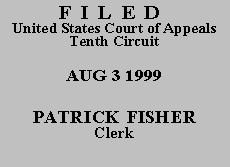

| UNITED STATES OF AMERICA,
Plaintiff-Appellee, |
|
| v. | |
| TERRY O'TOOLE,
Defendant-Appellant. |
|
Defendant Terry O'Toole, who pleaded guilty to one count of misprision of felony based on his concealment of an elaborate mail fraud scheme, appeals from the district court's sentence imposing restitution in the amount of $163,284. O'Toole contends the record establishes no nexus between his count of conviction and investor losses. We exercise jurisdiction pursuant to 28 U.S.C. § 1291 and affirm.
In the summer of 1997, O'Toole and several other individuals began promoting the sale of "gold-backed railroad bonds." Purchasers were told the bonds would be traded in international markets and would generate astronomical returns on investment. In truth, the bonds were virtually worthless and investors were essentially part of nothing more than a Ponzi scheme. In September 1997, the leader of this fraudulent scheme, Sloan Dupont (a.k.a. James Rice), directed promoters, including O'Toole, to travel to London to receive their initial payments. Dupont, however, did not distribute any funds. Upon his return from London, O'Toole continued to promote the railroad bond scheme and, from September 1997 to March 1998, collected $163,284 from various investors. O'Toole did not forward much of these funds to the California bank where he had previously sent investors' "bond purchase" payments, but kept the money for himself. Although the record is not altogether clear as to when the scheme ultimately unraveled, O'Toole's role ceased in March 1998.
In September 1998, O'Toole was charged by criminal information with one count of misprision of felony in violation of 18 U.S.C. § 4. Specifically, the charge read:
From in or about July, 1997, through in or about March, 1998, in the Western District of Oklahoma, and elsewhere, Terry O'Toole, the defendant herein, having knowledge of the commission of a felony by certain individuals, to-wit: conspiracy to commit mail fraud, in violation of [18 U.S.C. §§ 371, 1341], and did conceal such violation and did not as soon as possible make known the same to some judge or other person in civil or military authority under the United States.
App. at 10. Several weeks later, O'Toole pleaded guilty to the charge pursuant to a plea agreement. At the sentencing hearing, the court heard evidence on victim losses and ultimately imposed a restitution order of $163,284. O'Toole now appeals the restitution order.
Except to the extent agreed to by the parties in a plea agreement, see 18 U.S.C. § 3663(a)(3), restitution is confined to "the loss caused by the specific conduct that is the basis of the offense of conviction." Hughey v. United States, 495 U.S. 411, 413 (1990). The sole issue on appeal is whether there is enough evidence to support a connection between the acts to which O'Toole pleaded guilty and the court's $163,284 restitution order. The answer is clearly yes.
Although restitution could have been imposed against O'Toole for investor losses flowing from his misprision prior to his September 1997 London trip, the court, acting at the urging of prosecutors, opted only to assess restitution for events occurring after September 1997. There is ample evidence in the record that, upon his return from London, O'Toole solicited and/or received railroad bond investments from five individuals totaling $163,284. App. at 204-08. O'Toole claims some of these funds were received prior to September 1997. The timing is ultimately irrelevant. O'Toole pleaded guilty to being aware of the fraudulent investment scheme from July 1997 through March 1998, thereby subjecting all acts during that time period to a restitution award. O'Toole also suggests he was unaware of the fraudulent nature of the investments. That claim, however, is directly refuted by his guilty plea. If O'Toole felt he was a mere victim of Sloan Dupont and/or other promoters, he should not have pleaded guilty to misprision of felony.
The judgment of the district court is AFFIRMED.
Entered for the Court
Mary Beck Briscoe
Circuit Judge
*.This order and judgment is not binding precedent, except under the doctrines of law of the case, res judicata, and collateral estoppel. The court generally disfavors the citation of orders and judgments; nevertheless, an order and judgment may be cited under the terms and conditions of 10th Cir. R. 36.3.